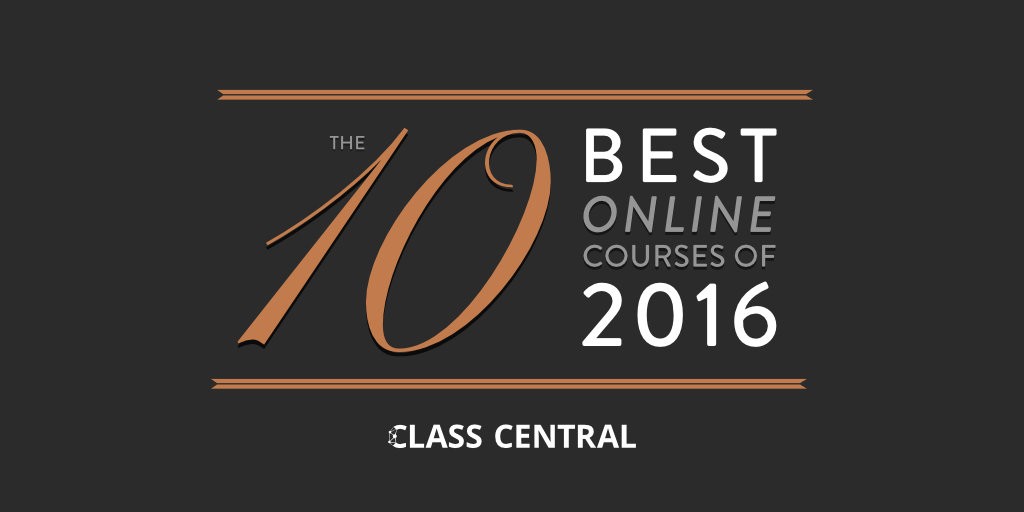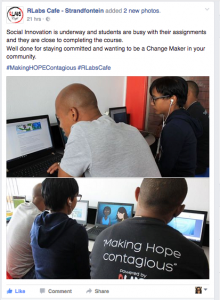In 2016 the University of Cape Town (UCT) was ranked as the second best institution creating MOOCs according to a report published by MOOC aggregator website Class Central. The UCT MOOC team would like to thank all our participants for their constructive reviews.
In terms of the methodology for the ranking it appears that by using the course ratings of a course to represent its university, Class Central took the Bayesian average of each to compile its list. Universities with fewer than five courses or fewer than 50 ratings were excluded.
Not only was UCT ranked as the second best institution, but our course Becoming a changemaker: Introduction to Social Innovation was ranked in Class Central’s top 10 best online courses of 2016. Again, over 8000 reviews were analysed and the Bayesian average of their ratings were used to compile the top-rated free online courses for 2016.
Becoming a changemaker is designed to encourage people to begin acting as social innovators and changemakers, debunking common assumptions around what resources are needed to get started.
“I have just finished the course and cannot express enough how energizing and motivating it was to be taken on a journey of out the box thinking and new vision towards social problems with examples of down to earth achievable solutions.”
“For anyone who is concerned about social problems and wants to make a difference, this course will give you a foundation and spark your thinking. I wish everyone could be exposed to this thinking because I know we can solve these problems, however wicked they may be..”
The course is offered in conjunction with the UCT GSB Bertha Centre for Social Innovation and Entrepreneurship and RLabs – RLabs empowers youth through innovative and disruptive technology by teaching them vital skills and providing much needed support and a sense of community.
Becoming a changemaker is one of seven free online courses currently available from UCT, and several of them have been highly rated by participating students. Earlier in 2016, UCT’s first two MOOCs, What is a Mind, led by Professor Mark Solms and Medicine and the Arts: Humanising healthcare, hosted by Professors Steve Reid and Susan Levine were ranked in Class Central’s top 50 online courses of all time.
With over 80 reviews on Class Central, Prof Solms’ What is a Mind received the highest praise from learners:
“A very thought provoking and insightful course. Mark Solms is hugely engaging and paces his lectures well. His explanations are careful, very lucid but never boring. The best MOOC I have taken.”
The interdisciplinary, Medicine and the Arts: Humanising healthcare featured 17 academics and healthcare practitioners sharing their perspectives:
“This is an absolutely brilliant course! Each week you look at a topic within the healthcare system through a different perspective related to the arts, i.e. literature, sociology, anthropology, artistic performance. This broad overview really allows you to generate different perspectives and viewpoints. You will be challenged, you will change your views when you do this course.” – Medicine and the Arts
Our other courses, Education for All: Disability, Diversity and Inclusion, Julia Scientific Programming, and Understanding Clinical Research have all garnered positive reviews as well:
“Very enjoyable and thought provoking course. Challenges your views and provides the practical and solution orientated strategies you need to improve this sector in education as a parent / educator/ community member / policy maker / volunteer” – Educational for All
“Finished this course from Coursera and I really enjoyed this one. They provided an interesting analytical programming language that I believed most people haven’t heard nor used it. I really recommended everyone to give it a try, because Julia provided a unique environment for analyze data. And this course provides us a fundamental knowledge of Julia. – Julia Scientific Programming
“This is an excellent course for anyone looking to develop an understanding of the “why” behind statistical analysis! The instructor does a wonderful job of explaining tricky concepts. I now feel better able to understand – and not be afraid of – methods and results sections in medical journal articles. Thanks, Dr. Klopper!” – Understanding Clinical Research
More courses are in production for 2017 – including the soon-to-be launched Extinctions: Past and Present, with renowned palaeobiologist, Professor Anusuya Chinsamy-Turan. We hope the new courses will be as well received as our current courses.
To learn more about our free online courses and to sign up visit: www.cilt.uct.ac.za/cilt/moocs-uct



